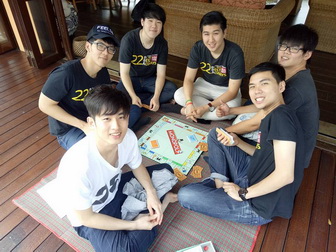
Written by Soravut Sunchindah, BBA#22
In BBA Thammasat, every fourth year student is required to take a course called Strategic Management, a class encompassing accrued knowledge from past courses taken by the student, whether it would be marketing, finance or accounting majors. Briefly put, Strategic Management requires students to work in teams in order to solve a business case, with focus to management level strategies, as stated by the course name, The cases are then presented, which is followed by a discussion session from the whole class to challenge and inquire the team's logical, analytical, and creativity skills. Ultimately, students taking the class get to learn about what works and what doesn't in various industries, and most importantly, with high relevance to post classroom environments.
For the last session, the class was held at a new venue: the very lovely home of the instructor, Ajarn Supawat Likittanawong. Despite being held at a non-classroom venue, there was as much or if not, more learning.
The task for the session was simple: form groups of 2-8 and play the famous board game: Monopoly. At the moment, some students were thrilled with such an assignment, and some even questioned the direction of which the class was heading towards. After several hours of play, the class finally came to an end and to everyone's surprise, the game, according to Ajarn was much more than just a game, as it included a multitude of key business concepts embedded into many of the mechanics and rules of the game.
|

An example of this would be one of the property areas in the game. The rule is that a player can purchase the property and build up to 4 houses and for the other players who land on this property they would have to pay rent according to the number of houses build. Logically, building the maximum amount of houses (4) would yield the most return on investment for the player, but in truth, 3 houses would be the most optimum. This is because the cost of investment and return on investment (rent) capped off at 3 houses, thus applying the concept of diminishing returns.
Other examples of key business concepts embedded in the game were, first mover advantage, the S-Curve life cycle, mortgages and rent, bankruptcy, and many more. Theses small and little bite sized chunks of business concepts were scattered around different dimensions of Monopoly and all added up to a great learning experience for every student.
To sum up the course, Ajarn mentioned that learning does not stop after you leave the classroom, but rather, learning can take place anywhere and its by questioning the status quo and exploring how things work in everyday life is how a person can finally become a life-long learner, one of the qualities of many successful individuals.
Finally, on behalf of the class, I would like to express my gratitude to Ajarn Supawat for hosting the last session at his lovely home and for bringing in a fresh new perspective on education and putting the spotlight on the importance of being a lifelong learner. Definitely worth waking up early on a Sunday morning!
Posted on November 29, 2016
ãºàÊÃç¨ÃѺà§Ô¹¤èÒµÑëÇà¤Ã×èͧºÔ¹¨Ó¹Ç¹à§Ô¹ 14,750.- ºÒ· ¢ÍàºÔ¡¨èÒÂà¾Õ§ 12,650.- ºÒ· | |











